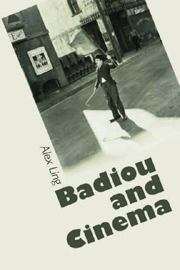Book contents
- Frontmatter
- Contents
- Acknowledgements
- Abbreviations of Frequently Cited Texts
- Introduction: Gorky's Maxim
- 1 Presenting Alain Badiou
- 2 Can Cinema be Thought?
- 3 In the Kingdom of Shadows
- 4 An Aesthetic of Truth
- 5 An Instant or an Eternity: Thinking Cinema After Deleuze
- 6 Alain Resnais and the Mise en Scène of Two
- 7 The Castle of Impurity
- Conclusion: The Future of an Illusion
- Bibliography
- Filmography
- Index
3 - In the Kingdom of Shadows
Published online by Cambridge University Press: 12 September 2012
- Frontmatter
- Contents
- Acknowledgements
- Abbreviations of Frequently Cited Texts
- Introduction: Gorky's Maxim
- 1 Presenting Alain Badiou
- 2 Can Cinema be Thought?
- 3 In the Kingdom of Shadows
- 4 An Aesthetic of Truth
- 5 An Instant or an Eternity: Thinking Cinema After Deleuze
- 6 Alain Resnais and the Mise en Scène of Two
- 7 The Castle of Impurity
- Conclusion: The Future of an Illusion
- Bibliography
- Filmography
- Index
Summary
Let no one who is not a geometer enter here.
PlatoFalse real copies of a false real
It is not in turning away from appearance or in praising the virtual that we have a chance of attaining to the Idea. It is rather in thinking appearance as appearance, and therefore as that which, of being, comes to appear, and gives itself to thought as deception of vision.
Alain BadiouOur first declaration must be that any understanding of cinema as an ontological art on the basis of some ‘essential’ relation it exhibits between its own intrinsic semblance and an objective reality which remains fundamentally exterior to it is a dead end. No matter how seductive André Bazin's sentiments may be, we cannot today uphold any argument that maintains ‘there is ontological identity between the object and its photographic image’ (WC2, p. 98). This is not, however, to say that Bazin's protestations regarding the inherent realism of cinema need be abandoned altogether. The terms of the relationship simply need to be altered: cinema is not in fact an ontological art, rather, cinema is a logical art. What exactly does this mean? For one thing – in a variation on the impure theses – it tells us that cinema is not an essential art, an art of essences. Rather – and this is our fundamental point – cinema is an art of appearances. Because, as we will see, appearance is for Badiou one and the same as logic. For the present let it suffice us to say of this identification that what appears is nothing other than a logical determination of what is.
- Type
- Chapter
- Information
- Badiou and Cinema , pp. 55 - 84Publisher: Edinburgh University PressPrint publication year: 2010



